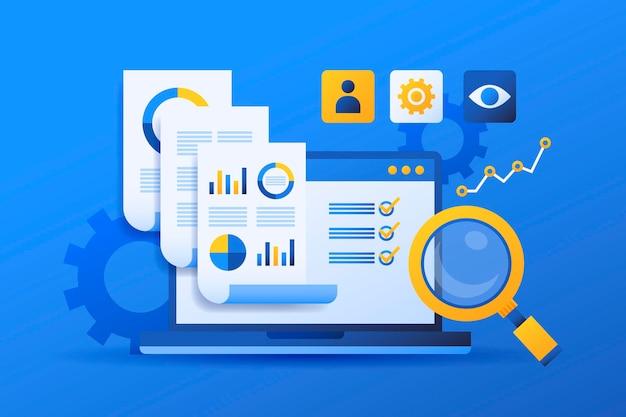In today’s digital world, employee monitoring has become a common practice in many workplaces. With the advent of new technologies, employers can easily track and monitor their employees’ activities. However, employee monitoring can raise concerns about data privacy and security, especially after the introduction of the General Data Protection Regulation (GDPR).
What is GDPR monitoring? Can employers monitor their employees’ activities? Is it legal to do so? These are just some of the questions that this blog post seeks to answer. In this comprehensive guide, we will explore the topic of GDPR employee monitoring and how it affects employers and employees.
We will discuss the different aspects of employee monitoring policies under GDPR, including what constitutes monitoring, what data is collected, and how it is used. We will also examine GDPR’s applicability in employee data and provide insights into how employers can comply with GDPR regulations concerning employee monitoring practices.
If you’re an employer, HR professional, or just curious about GDPR employee monitoring policies, this blog post is a must-read. We’ll debunk common myths about employee monitoring, clarify what GDPR requires of businesses, and provide tips to help you remain compliant while keeping your employees’ trust.
So, whether you’re a small business owner or an employee concerned about your privacy, read on to learn all about GDPR employee monitoring.
GDPR Employee Monitoring
Employee monitoring has become an essential part of employee management, especially for remote workers. However, with the recent General Data Protection Regulation (GDPR) implemented in the EU, companies must adhere to strict data protection rules to protect their employees’ privacy. In this section, we’ll take a closer look at GDPR employee monitoring.
What is Employee Monitoring
Employee monitoring refers to the practice of observing and tracking employees’ activities either in the workplace or remotely. It includes monitoring their performance, productivity, and behavior, as well as their internet usage, emails, keystrokes, and social media activity. Employee monitoring helps companies improve productivity, enforce company policies, and prevent data breaches.
GDPR Employee Monitoring Requirements
The GDPR outlines strict guidelines that companies must follow when monitoring their employees. Companies must ensure that monitoring their employees is:
- Necessary for business purposes
- Carried out in a transparent manner
- In compliance with data protection legislation
- Appropriate to the circumstances
- Proportionate to the risks involved
- Carried out with employee consent or based on legitimate interests
Companies must also inform their employees about the extent and purpose of the monitoring and take steps to protect their information.
Best Practices for GDPR Employee Monitoring
To ensure compliance with GDPR employee monitoring rules, companies must:
- Conduct privacy impact assessments (PIA)
- Provide their employees with clear and concise information about the monitoring
- Obtain explicit consent from employees before monitoring
- Limit monitoring to only what is necessary for business purposes
- Use appropriate and secure technologies to monitor
- Notify employees of any data breaches promptly
- Regularly review and update policies and procedures to ensure compliance
Employee monitoring can be beneficial for businesses, but companies must follow GDPR regulations to protect their employees’ privacy. By implementing best practices for GDPR employee monitoring, companies can ensure compliance with the law while improving productivity and performance.
What is GDPR Monitoring
GDPR monitoring is a data protection initiative aimed at safeguarding the privacy of EU citizens. GDPR (General Data Protection Regulation) empowers citizens to have control over their data and ensure that companies adhere to the 14 fundamental principles. GDPR monitoring is intended to ensure that companies and organizations comply with these regulations.
Understanding GDPR Monitoring
GDPR monitoring entails regularly reviewing and auditing an organization’s data processing activities to ensure compliance with GDPR regulations. Companies must also keep track of any data breaches and report them immediately to the supervisory authority.
The Role of Employee Monitoring in GDPR
Employee monitoring is a practice used by employers to track employee productivity, performance, and compliance with company policies. However, under GDPR, businesses must ensure that their employee monitoring practices align with GDPR regulations.
Types of Employee Monitoring
There are various methods of employee monitoring, such as video surveillance, keylogging, and email monitoring. To comply with GDPR, companies must ensure that these monitoring practices are transparent to employees. Businesses must also acquire explicit consent from employees before engaging in any monitoring activities.
Importance of GDPR Monitoring in the Workplace
The proliferation of technology has made it easier for companies to collect, process, and store data. Still, it has also heightened the risk of data breaches and unauthorized access. GDPR monitoring is essential because it helps businesses uphold their data protection obligations and avoid the financial and reputational damage caused by data breaches.
In conclusion, GDPR monitoring is an integral part of data protection, and organizations must ensure compliance to avoid hefty fines and legal repercussions. As an employee, it’s crucial to understand your rights and company policies regarding GDPR monitoring to protect your privacy.
Employee Monitoring Policy
As an employer, monitoring your employees’ performance is a crucial part of ensuring that your business runs smoothly. However, you must ensure that your actions comply with GDPR regulations. Here, we explore how you can create an employee monitoring policy that respects the privacy rights of your workers.
Create a Clear Monitoring Policy
Every business must have a clear and concise monitoring policy in place. Your policy should include the following:
- Why you’re monitoring your employees
- What you’ll be monitoring
- How you’ll be monitoring
- What the data will be used for
- The legal basis for monitoring
Make sure your policy is easily accessible to your employees and that they understand it. Also, ensure that you update it regularly to reflect changes in your business’ practices.
Get Employee Consent
To ensure that you comply with GDPR regulations, you need to get your employee’s explicit consent before monitoring them. To obtain consent, you should provide a copy of the monitoring policy and ask them to sign a consent form.
Be sure to explain that non-consent doesn’t mean dismissal from work. Employees must know that their decision won’t affect their employment status or work progress.
Limit What You Monitor
You should limit the data you collect to only that which is necessary for managing your business. Avoid collecting personal data that isn’t needed, such as sensitive information, like medical records and bank details.
Similarly, limit monitoring to company-owned devices and networks. Personal devices and social media accounts of employees must be off-limits.
Protect Data Privacy
Make sure that you treat the data you collect with the utmost regard for privacy. Follow the GDPR regulations on data storage, processing, and secure transfer of data. Avoid transferring employees’ data without proper encryption to avoid data breaches.
Creating a GDPR compliant employee monitoring policy is essential for all businesses. Be sure to clearly articulate the scope of monitoring, obtain consent, limit monitoring, and protect employee privacy. Your actions in this regard will help you strengthen your workplace culture while complying with strict GDPR guidelines.
GDPR and Employee Performance Data
As an employer, it’s natural to want to monitor your employees’ performance to ensure that they are meeting expectations. However, when it comes to performance data, EU laws such as GDPR must be taken into account. The GDPR regulates the processing of personal data in the European Union and has strict requirements for the collection, storage, and use of employee data. Here are a few things you need to know.
What is Employee Performance Data
Employee performance data refers to any data that an employer collects on their employees’ work, such as productivity rates, customer reviews, sales records, and more. Employers can use this data to evaluate employees and make decisions about promotions, pay raises, and disciplinary action.
How Does GDPR Affect Employee Performance Data
Under GDPR, employee performance data is considered personal data, and therefore is subject to strict data protection laws. Employers must provide employees with notice of what data will be collected, how it will be used, and who will have access to it. Employees must also give their explicit consent to this collection.
Limitations on Employee Performance Data
The GDPR also limits the types of employee data that can be collected. Employers are only allowed to collect data that is necessary for the performance of the employee’s job. They cannot collect data that is irrelevant or excessive, and must delete it once it is no longer needed.
What to Do as an Employer
To comply with GDPR requirements, employers should implement clear policies and procedures for collecting and handling employee performance data. Employers must take responsibility for ensuring that employees’ data is treated with the utmost care, and that employees are aware of their rights.
In conclusion, while it’s crucial to monitor employees’ performance, employers must carefully handle employee performance data and be aware of GDPR regulations. By properly handling employee data, employers can maintain a strong relationship with their employees and comply with GDPR rules.
Is GDPR Applicable in Employee Data
Any organization that collects, processes, stores, or transmits personal data of European Union citizens is subject to the General Data Protection Regulation (GDPR). This regulation doesn’t make any distinction between the data of customers, partners, or employees, meaning it applies to all these categories of personal data.
Employee Data and GDPR
While the GDPR applies equally to employee data, there are some nuances that need to be taken into account. For example, companies may rely on the legitimate interest of the employer to process employee data. However, they must ensure that the data processing does not infringe upon employee rights and freedoms, and that the processing is strictly necessary for purposes directly related to the employer’s business.
Additionally, employers must ensure that they obtain clear and explicit consent from employees for the processing of personal data and that such consent can be withdrawn at any time. Furthermore, employees have the right to access their personal data, correct inaccuracies, erase the data, restrict processing, and transfer the data.
Special Categories of Employee Data
Special categories of personal data, such as information on a person’s health, race, religion, or sexual orientation, require additional protection. Employers must obtain explicit consent to collect and process such data, and ensure that the data is processed strictly for legitimate purposes, such as fulfilling an employment contract or complying with legal obligations.
Consequences of Non-Compliance
Employers who are found to be non-compliant with the GDPR may face significant fines and reputational damage. Therefore, it is essential that employers take GDPR compliance seriously and ensure that all employees are aware of the company’s data protection policies and procedures.
In conclusion, the GDPR applies to employee data as much as it does to customer data. Employers must obtain clear and explicit consent from employees for the processing of personal data, ensure that special categories of personal data are processed strictly for legitimate purposes, and provide employees with the right to access and control their personal data. Failure to comply with GDPR can have significant consequences, so it’s essential that employers take their GDPR obligations seriously.
Monitoring Employees in the Workplace
When it comes to monitoring employees in the workplace, there are many factors to consider. Employers have various reasons for monitoring their employees, including productivity, security, and legal compliance. However, there are also concerns around employee privacy and data protection.
Legality of Employee Monitoring
Employers must ensure that their monitoring methods comply with data protection laws, such as the General Data Protection Regulation (GDPR). GDPR employee monitoring guidelines state that employers must have a legitimate reason for monitoring their employees and that the monitoring must be proportionate and necessary.
Types of Employee Monitoring
There are various ways to monitor employees, including video surveillance, email and internet monitoring, and keystroke monitoring. Employers must inform their employees of the monitoring methods used and the reasons for monitoring.
Impact on Employee Privacy
Employee monitoring can have a significant impact on employee privacy. Employers must strike a balance between protecting their business interests and respecting their employees’ privacy rights. Employers should also ensure that they have a clear and transparent employee privacy policy in place.
Benefits and Drawbacks of Employee Monitoring
Employee monitoring can have benefits for both employers and employees. It can increase productivity and improve security. However, it can also have drawbacks, such as damaging employee morale and creating a culture of distrust.
Overall, monitoring employees in the workplace is a complex issue with legal, ethical, and practical considerations. Employers must ensure that they comply with data protection laws and respect their employees’ privacy rights while balancing their business interests.
Do Employers Have the Right to Monitor Employees
When it comes to employee monitoring, many people wonder if their employers have the right to monitor their activities. The short answer is yes, but the extent of the monitoring is limited by laws and regulations in various countries. Let’s take a deeper look at this issue and explore what employers can and cannot do when it comes to employee monitoring.
Monitoring Policies
Employers often have monitoring policies in place that employees must adhere to. These policies outline what types of monitoring are allowed and how the company will handle the data collected. It is essential to review these policies carefully to understand what monitoring will be conducted and how the collected data will be used.
Legal Limitations
The extent to which employers can monitor their employees is limited by laws and regulations. The General Data Protection Regulation (GDPR) and the California Consumer Privacy Act (CCPA) are some examples of regulations that limit employers’ ability to monitor employees. Employers should ensure they are complying with these regulations to avoid any legal consequences.
Types of Monitoring
There are various types of employee monitoring that employers can use, including computer monitoring, video surveillance, and GPS tracking. While some of these monitoring methods are legal, there are limitations to when and how they can be used. For example, employers cannot monitor employees during their breaks, and they cannot monitor employees’ personal conversations.
Employee Privacy
Employers also have a responsibility to respect their employees’ privacy. Employers should inform employees of any monitoring that will take place and ensure that the monitoring is limited to what is necessary for legitimate business purposes. If an employee feels that their privacy has been violated, they can take legal action against their employer.
While employers do have the right to monitor their employees, there are limitations to what they can do. It is essential to review monitoring policies carefully and ensure that they comply with regulations. Employers must also respect their employees’ privacy and limit their monitoring to what is necessary for legitimate business purposes.
Is it Illegal for Employers to Monitor their Employees at Work
Employee monitoring has become increasingly popular in recent years, with many employers utilizing various forms of monitoring technology to track their employees’ activities. However, the question remains: Is it illegal for employers to monitor their employees at work?
Understanding Employee Monitoring
Before we dive into the legality of employee monitoring, let’s define what it is. Employee monitoring refers to the use of technology to track or observe employees’ activities, both on and off the job. This can include monitoring email and internet usage, phone calls, video surveillance, and even GPS tracking.
The Legality of Employee Monitoring
The legality of employee monitoring largely depends on the jurisdiction, but in many cases, it is legal. However, employers must abide by certain laws and regulations to avoid legal issues.
Firstly, employers must inform employees that they are being monitored. This can be done through a written policy or by explicitly telling employees. Failing to inform employees can result in legal action.
Secondly, employers are prohibited from monitoring certain activities, such as personal phone calls, emails, and social media accounts. Employers must also be careful not to discriminate against employees based on the information acquired through monitoring activities.
Finally, it is important for employers to follow the principles set forth by the General Data Protection Regulation (GDPR). This regulation outlines how employers can collect, process, and store employee data, as well as employees’ rights concerning this data.
In conclusion, it is not illegal for employers to monitor their employees at work, but they must follow certain laws and regulations to avoid legal issues. Employers must be transparent about monitoring activities and ensure they do not discriminate against employees or monitor personal activities. The GDPR also sets forth guidelines for how employers can handle employee data. By following these guidelines, employers can effectively monitor their employees while avoiding legal issues.


